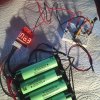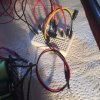Thanks I will keep that in mind. Didn't find any more information about this and sorry if I was not clear enough.
Well, the bug really got me but frustrated I dont understand everything. So much to learn. Sad I didnt got the bug earlier

Ah, I thought so.
To get the basics of electronics is very easy. Electronics is heavily based on the application of maths so, to get started, you need arithmetic and fundamental algebra. All you need to do then is to visualize electrons flowing through a conductor (current), the thing that forces them to flow (voltage), and the thing trying to stop the electrons (resistance). It is very important to fully understand one stage and only then move on to the next stage. That way you are building on firm foundations.
The relationship between current, voltage, and resistance is defined quite simply by Ohms law: I=V/R
Then learn Kirchoff's first and second laws, which are also dead simple (obvious really) and you will have a firm grounding in the subject. I could not come to terms with Kirchoff's laws partly because of the frighting name but also because they are so simple. I thought I must have gone wrong because they seemed so obvious and basic- but no, that is what they are.
Next capacitors- conceptually awkward but not difficult
Inductors- as capacitors, but a bit more tricky.
Transformer- simple
The next move would be to learn the two fundamental functions of silicon diodes.
The next move would be to learn the two fundamental functions of bipolar junction transistors.
And then learn the one fundamental function of MOSFETs.
After that you have all the tools to design/understand some pretty sophisticated analog circuits.
The next move would be to learn the one basic function of an operational amplifier (comparators are pretty much the same)
And then you could design/understand some very sophisticated analog circuits.
The above would be the foundations of analog design.
Then there are the fundamentals of the digital field which, in principle, are not difficult either.
Things do get really heavy in advanced analog and digital designs though, but you needn't worry about that. As in most subjects, you never stop learning about electronics, and it is vital to learn by your mistakes- I do everyday.
If anyone is getting into electronics, or any field for that matter, getting a good book on the subject is essential.
It is all very nice for me to say all this after years of experience, and of course it is a gross oversimplification, but in principle, it is correct. I have tutored many people at work who have been struggling, even after learning the theory at university or tech college (by the way this is no indictment of academia- in fact most of the ex-grads were amazingly talented both in theory and practical). But after getting just a few basic practical principles under their belts, they have progressed well. I had the same experience when I was starting out in electronics; the advice came from other engineers, including grads, in our department. I seem to have a different way of learning to most people; I struggle learning the advanced stuff until I fully understand the basic function. Some other ETO members have said the same thing.
To take an example, many students knew how to do all the calculations for an opamp: gain, offset, frequency stability etc, but, in spite of learning all the difficult stuff, they didn't know how to apply an opamp (apart from in the classic configurations that is) in a practical circuit, because they didn't appreciate the one fundamental characteristic of an opamp: it cannot abide its two inputs being even minutely different and will do all it can, by altering its output, to achieve this balance. It does not matter where the opamp is in the circuit, this fundamental axiom applies.
As you may have guessed, learning about electronics is a hobby horse- it is the waste of talent for someone who is struggling that gets me.
Lecture over.
spec











